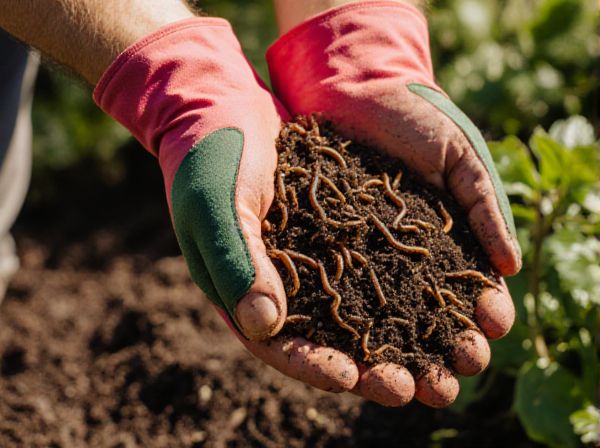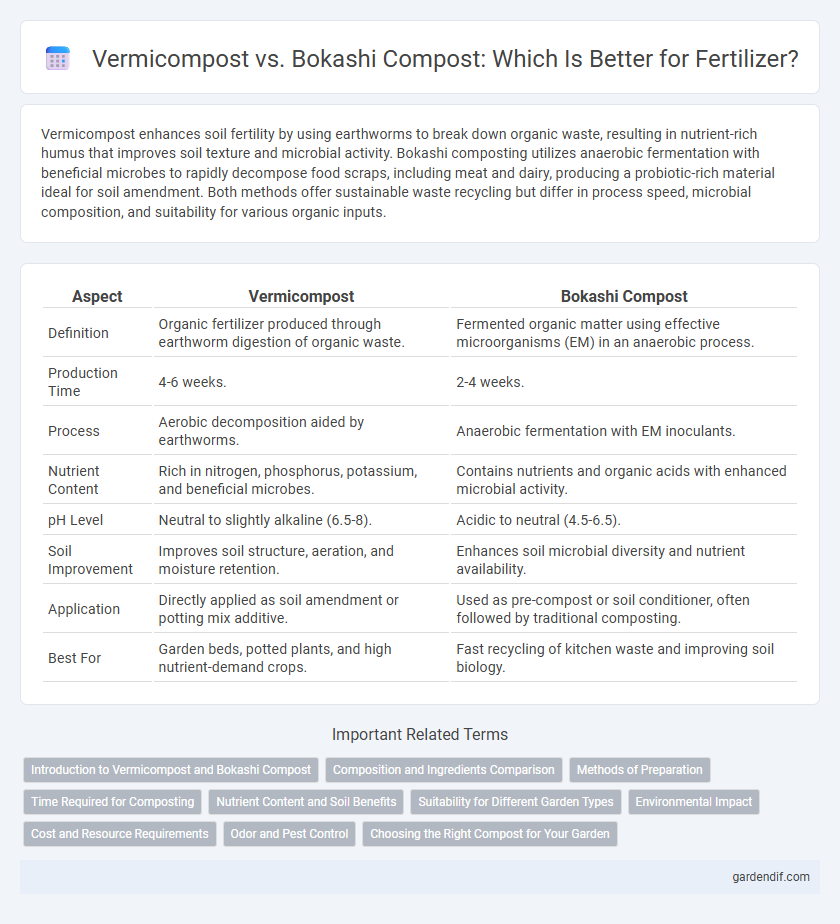
Vermicompost vs Bokashi compost Illustration
Vermicompost enhances soil fertility by using earthworms to break down organic waste, resulting in nutrient-rich humus that improves soil texture and microbial activity. Bokashi composting utilizes anaerobic fermentation with beneficial microbes to rapidly decompose food scraps, including meat and dairy, producing a probiotic-rich material ideal for soil amendment. Both methods offer sustainable waste recycling but differ in process speed, microbial composition, and suitability for various organic inputs.
Table of Comparison
| Aspect | Vermicompost | Bokashi Compost |
|---|---|---|
| Definition | Organic fertilizer produced through earthworm digestion of organic waste. | Fermented organic matter using effective microorganisms (EM) in an anaerobic process. |
| Production Time | 4-6 weeks. | 2-4 weeks. |
| Process | Aerobic decomposition aided by earthworms. | Anaerobic fermentation with EM inoculants. |
| Nutrient Content | Rich in nitrogen, phosphorus, potassium, and beneficial microbes. | Contains nutrients and organic acids with enhanced microbial activity. |
| pH Level | Neutral to slightly alkaline (6.5-8). | Acidic to neutral (4.5-6.5). |
| Soil Improvement | Improves soil structure, aeration, and moisture retention. | Enhances soil microbial diversity and nutrient availability. |
| Application | Directly applied as soil amendment or potting mix additive. | Used as pre-compost or soil conditioner, often followed by traditional composting. |
| Best For | Garden beds, potted plants, and high nutrient-demand crops. | Fast recycling of kitchen waste and improving soil biology. |
Introduction to Vermicompost and Bokashi Compost
Vermicompost is an organic fertilizer produced through the decomposition of organic waste by earthworms, resulting in nutrient-rich castings that enhance soil fertility and microbial activity. Bokashi composting involves fermenting organic waste using specific anaerobic microbes, creating a pre-compost product that quickly integrates into soil and improves nutrient availability. Both methods offer sustainable alternatives to chemical fertilizers, with vermicompost emphasizing worm-driven aerobic processes and Bokashi focusing on microbial fermentation under anaerobic conditions.
Composition and Ingredients Comparison
Vermicompost is rich in nutrients such as nitrogen, phosphorus, potassium, and beneficial microbes derived from earthworm digestion of organic waste, enhancing soil structure and fertility. Bokashi compost consists of fermented organic material inoculated with effective microorganisms (EM), primarily lactic acid bacteria, yeast, and phototrophic bacteria, which rapidly break down food waste while retaining more nutrients than traditional composting. The microbial diversity in vermicompost promotes long-term soil health, whereas Bokashi is highly efficient for quick nutrient recycling and is particularly effective in acidic or compacted soils.
Methods of Preparation
Vermicompost preparation involves layering organic waste with earthworms, primarily Eisenia fetida, in a controlled environment where worms decompose the material into nutrient-rich castings over several weeks. Bokashi composting utilizes an anaerobic fermentation process by inoculating organic waste with Effective Microorganisms (EM), including lactic acid bacteria, yeasts, and phototrophic bacteria, inside an airtight container for about two weeks. The vermicomposting method relies on aerobic conditions and biological digestion by worms, while Bokashi composting depends on microbial fermentation to pre-digest waste before soil incorporation.
Time Required for Composting
Vermicompost typically requires 2 to 4 months for decomposition, leveraging earthworms to break down organic matter efficiently. Bokashi composting, on the other hand, uses anaerobic fermentation and completes the initial composting process in as little as 2 to 4 weeks. The faster turnaround time of Bokashi makes it ideal for gardeners seeking quick nutrient-rich amendments, while vermicompost offers a more thorough breakdown beneficial for long-term soil health.
Nutrient Content and Soil Benefits
Vermicompost is rich in nitrogen, phosphorus, potassium, and beneficial microbes that enhance soil aeration and microbial activity, promoting robust plant growth. Bokashi compost contains high levels of organic acids and retains more nutrients like nitrogen and phosphorus due to its anaerobic fermentation process, improving soil structure and moisture retention. Both fertilizers boost soil fertility, but vermicompost excels in microbial diversity while Bokashi enhances rapid nutrient availability and soil conditioning.
Suitability for Different Garden Types
Vermicompost suits vegetable gardens and flower beds due to its rich microbial content that enhances soil structure and nutrient availability. Bokashi compost is ideal for container gardens and urban settings as it ferments organic waste rapidly, producing a nutrient-dense liquid fertilizer with minimal odor. Gardeners choose vermicompost for long-term soil health and bokashi for quick nutrient cycling in compact spaces.
Environmental Impact
Vermicompost enhances soil quality by promoting microbial diversity and reducing chemical fertilizer dependency, leading to lower greenhouse gas emissions and improved carbon sequestration. Bokashi composting accelerates organic matter breakdown through anaerobic fermentation, minimizing methane release and preserving nutrients, which contributes to less environmental pollution compared to traditional composting methods. Both methods support sustainable waste recycling, but vermicompost has a stronger impact on long-term soil health and biodiversity.
Cost and Resource Requirements
Vermicompost production demands a moderate initial investment in worm bins and quality bedding material, while bokashi composting requires minimal resources with simple airtight containers and bokashi bran, making it more cost-effective for small-scale use. Vermicomposting relies heavily on live earthworms and consistent organic waste feed, which can increase maintenance efforts and resource input. Bokashi composting accelerates fermentation using beneficial microbes, consuming less space and input materials, thus reducing overall cost and resource requirements compared to vermicompost systems.
Odor and Pest Control
Vermicompost produces minimal odor due to the presence of earthworms that efficiently break down organic matter, making it less attractive to pests. Bokashi compost uses anaerobic fermentation, which generates a strong, sour smell but effectively suppresses pests and pathogens through beneficial microbes. Both methods enhance soil fertility, but vermicompost offers a more odor-neutral solution, while bokashi excels in pest control.
Choosing the Right Compost for Your Garden
Vermicompost provides rich, slow-release nutrients and beneficial microorganisms that enhance soil structure and promote healthy root development, making it ideal for vegetable gardens and flower beds. Bokashi composting utilizes anaerobic fermentation to break down organic waste quickly, enriching soil with valuable nutrients and improving microbial diversity, suitable for gardeners seeking faster composting methods. Selecting between vermicompost and bokashi depends on your garden's nutrient needs, composting timeline, and soil health objectives.
Vermicompost vs Bokashi compost Infographic

 gardendif.com
gardendif.com